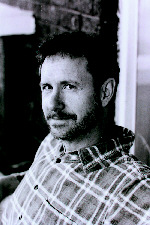On Writing
The Importance of Place by Ron Rash
When I was five years old, one of the most remarkable moments of my life occurred: my grandfather read to me. It was a warm, summer evening and my grandfather, still dressed in his work clothes, was smoking a Camel cigarette as he lingered at the kitchen table after a hard day’s work. But when I handed my grandfather the red and blue book and asked him to read to me he did not offer any excuse, not even the most obvious one. Instead, he laid the open book on the table before us, peering over my shoulder as he turned the pages with his work-and-nicotine stained fingers and I heard the story of a talking cat and his high, blue-striped hat.
What makes this anecdote so remarkable is that my grandfather could not read or write. He had grown up on a farm in the North Carolina mountains where children spent their mornings in fields instead of classrooms. What he had done was make up a story to fit the pictures that lay on the pages before us. Not surprisingly, I quickly realized that the story he was reading was very different from the one my mother had read from the same book.
The effectiveness of my grandfather’s performance was verified by my begging him to read The Cat and the Hat again the following Sunday. His story was different this time, the cat got into more trouble, and out of it less easily. It was as if the words on the page had scrambled around and rearranged themselves. At every opportunity in the following weeks I ambushed my grandfather so I might hear what new events might occur in this cat’s ever-changing life. My grandfather dutifully opened the book. His imagination, however, unlike his patience, was limited. After a half dozen variations, what I heard was pretty much repetitious, but there always seemed to be some sudden veering–a new line of dialogue, plot twist, or further description–that made each version unique. How could I not grow up believing words were magical? How could I not want to be a writer?
There were setbacks, of course. One of the great disappointments of my life was in Mrs. Brown’s first grade class when I realized the words below the pictures of Dick, Jane, Sally, and Spot were as stubbornly fixed to the page as bubble gum on shoe soles. No matter how many times I opened and closed my book, the words, unlike my grandfather’s, stayed on the same page and in the same order.
Nevertheless, this was only a momentary setback. My grandfather could not teach me how to read, but he had taught me how to use my imagination, and soon I was supplying words of my own to describe each scene. Before too long I was ignoring the drawings in the book as well. I made up Dick and Jane stories of my own. Not surprisingly, my Dick and Jane lived in a small town very similar to my own, and the ways of rural Carolina, became their ways. In my version Dick and Jane said “you all,” and “pecan,” and “yes’m.” They ate fried okra, grits, red-eye gravy and cat-head biscuits and drank sweetened ice tea and “co-colas.” I changed Jane’s name to Sarah Jane and (since my father would not allow me to have one) gave Dick a Marlin .22 rifle so he wouldn’t have to play with that sissy blue and yellow beachball anymore.
So it was that in my earliest attempts at creating an imaginative world my stories were set in the place I knew best. They still are, for almost all my work is set in South Carolina or North Carolina, the two places where my family has lived, worked, loved, and died for over two hundred years. “One place understood helps us understand all other places better,” Eudora Welty reminds us, and she is right, for one of the most interesting aspects of literature is how the most intensely regional literature is often the most universal. The best regional writers are like farmers drilling for water; if they bore deep and true enough into that particular place, beyond the surface of local color, they tap into universal correspondences, what Jung called the collective unconscious. Thus Faulkner’s Mississippi, Munro’s Ontario, and Marquez’s Columbia are both exotic and familiar.
When I wrote One Foot in Eden, I set the novel in a place, Jocassee Valley, that now is buried beneath a reservoir. Joyce, another great regionalist, once claimed that if Dublin were destroyed, it could be recreated by reading Ulysses. I would make no similar claim for my novel’s depiction of the Jocassee valley, but I have brought all that I know of that place into my story, hoping that I might go deep enough to bring something of that place, and all places, to the surface.

